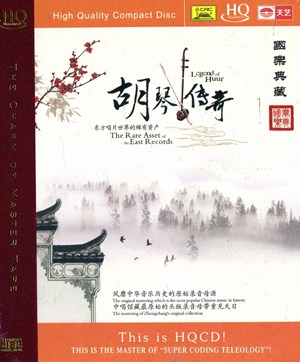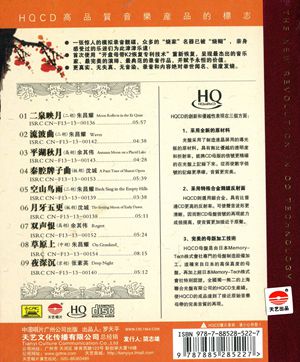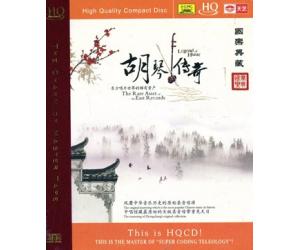

01 二泉映月 Moon Reflects in the Er Quan (Erhu)(二胡)
华彦钧曲 瞿春泉配伴奏 朱昌耀演奏 上海民族乐团二胡乐队与箜篌伴奏
Music: Hua Yanjun
Erhu: Zhu Changyao
Accompaniment: Konghou and Erhu Band of Shanghai Orchestra of Traditional Chinese Music
二胡的前身是胡琴,胡琴是古代中国北方少数民族所有拉弦乐器的统称,在唐代名“奚琴”,最初用竹片拉奏,宋代开始用马尾拉弦。二胡既适宜表现深沉、悲凄的内容,也能描写气势壮观的意境,音色接近人声,情感表现力极高。
The erhu, which is mainly constructed of various hard woods, has two strings with a bow playing between them. The sound box is covered with a snake skin which helps produce its distinctive tone colour. The erhu is one of the most widely used bowed instruments in China. Throughout its 500-year-old history, the construction of the instrument has been constantly upgraded so that its tone is now mellow and bright. Played with a variety of techniques, it is now extremely popular, for both solo and orchestral performance.
朱昌耀,中国著名二胡演奏家。他以其对音乐深刻、入微的理解和对乐曲细致、独到的处理,得到行家和同行的赞誉,被喻为“如杯中醇酒,满而不溢”,“弓弓诉人意、弦弦道世情”,“中国的帕尔曼” ,“世界一流的弦乐演奏家”,“人间国宝”。
Zhu Changyao is the famous erhu performer of China. He has been hailed as mellow wine, Chinese Perlman, world-class string player and national treasure by his deep special understanding of the music.
《二泉映月》,原名《依心曲》,是著名的民间盲艺人华彦钧(阿炳)的代表作。此曲以一种抒情式的音乐语言,向我们描绘了月映惠山泉的景色和作者那无限深邃的感情。 时而如泣如诉、凄凉哀怨;时而惆怅含蓄、时而高亢激奋,让人听后满眼泪花。听后犹如回到了冬日长夜里,一个步履蹒跚灵魂孤独的盲人阿炳走在漫天大雪的小巷里,唯有二胡与他形影相随,沉浮相依任凭灵魂随着这旋律渐渐地净化、升华!
The old name of Moon Reflects in the Er Quan is Follow the Heart which is the famous folk blind artist Hua Yanjun’s magnum opus. This music shows scenery of moonlight shine into the mountain spring and expresses the deep feeling of author. Sometimes feel like weep and dreariness. Sometimes feel like excitement and pleasure. It feels like go back to the long winter and a lonely blind man walks through the alley with his erhu. We become pure by the soul melody.
02流波曲Waves(二胡)孙文明曲 马圣龙配器 朱昌耀演奏 上海民族乐团小乐队伴奏
Music: Sun Wenming
Erhu: Zhu Changyao
Accompaniment: Mini-Band of Shanghai Orchestra of Traditional Chinese Music
《流波曲》是盲艺人孙文明的代表曲,创作于1952年冬季。这首乐曲是他流落异乡困苦生活的真实写照,他把自己比作默默流逝的水波,借琴声倾吐痛苦的心声,其思想内涵非常深刻。旋律凄苦、缠绵、深沉。
Waves is the magnum opus of blind artist Sun Wenming which creates in the winter 1952. The music is the real reflection of his life’s hardships. He compares himself to the quiet stream. He expresses his pain with the help of erhu. The thought is deep and the melody is miserable, lingering and deep.
03《平湖秋月》Autumn Moon on a Placid Lake(高胡)广东音乐 吕文成曲 余其伟演奏 广东省歌舞团四人小组伴奏
Guangdong Music
Music: Lu Wencheng
Gaohu: Yu Qiwei
Accompaniment: a four-member group from Guangdong Song and Dance Ensemble
高胡,是高音二胡的简称,即广东音乐中的“粤胡”,约在二十年代根据二胡改革而成,一般用铜丝弦,也有外弦用铜丝弦,里弦用丝弦的。演奏时两腿夹琴筒,用以控制音量及减少沙音,高胡音色清澈、明亮、富于表现力。
Gaohu is the abbreviation of high pitch erhu. It is also called yuehu. It reformed of erhu and used copper wire as string. You should control the volume by clamping canister. Gaohu has a clear and expressive tone.
余其伟 ,中国著名高胡演奏家。他的琴艺,继承了中国古典音乐崇尚风骨神韵的传统,发挥了广东音乐华丽抒情、轻灵活泼的特色。音乐界评论余其伟的演奏“富于诗意的幻想与哲理的深沉,境界优美而高远”,“开拓了中国高胡艺术的新格局”,“继吕文成、刘天一之后的广东高胡第三代传人”,美国音乐教育家、指挥家齐佩尔称余其伟为“一位具天才技巧和深刻艺术思想的音乐家。”
Yu Qiwei is the famous gaohu performer in China. His technology inherits the tradition of Chinese classical music, expresses the characteristic of Guangdong music. The music industry said that Yu Qiwei’s playing is poetic and has a beautiful realm, the third generation of Gungdong gaohu after Lu Wencheng and Liu Tianyi. America music educator and cantor Herbert Zipper said that he is a skilled genius and an elegant artistry and profound thought of musician.
《平湖秋月》又名《醉太平》,是广东音乐名家吕文成的代表作。它优美的音乐形象,通过浙江民歌和广东音乐特有韵味的融合,仪态万方的呈现在观众眼前。平静的湖面,皎洁的月色,垂柳的暗影,晚风的沁香,尽在高胡的吟唱之中。
Autumn Moon on a Placid Lake is also called Peace. It is the famous Guangdong Musician Lu Watching’s magnum opus. It named after one of the eight wonderful sights of the West Lake in Hangzhou, Zhejiang Province, is among his excellent works. Incorporating Zhejiang folk singing with Guangdong music, this piece of gaohu music presents an all-glorious image. The slow and graceful melody depicts the scene of the placid lake, serene and clear moonlight, shadows of willow trees and the soothing night breeze.
04秦腔牌子曲 A Paizi Tune of Shanxi Opera(板胡) 郭富团编曲 沈城演奏 上海民族乐团伴奏
Music: Guo Futuan
Banhu: Shen Cheng
Accompaniment: Shanghai Orchestra of Traditional Chinese Music
板胡,又称梆胡,秦胡。琴筒由木料或椰子壳制成,它的音色明亮高亢,常用于独奏、合奏或地方戏曲的伴奏,是深受中国人民喜爱的一种拉弦乐器。
Banhu is also called Banghu or Qinhu. Canister is made by wooden shell or coconut shell. Its tone is bright and always uses as an accompaniment to solo, concert and local operas. It is a bowed instrument which well liked by people.
沈诚, 中国音乐学院附中校长。著名胡琴演奏家,中国音乐学院教授,硕士研究生导师。沈诚的板胡演奏,能集多家风格于一身,韵味浓郁;音色饱满甘醇,运指生动细腻、运弓洒脱豪放、音乐热情粗犷。
Shencheng is the headmaster of China conservatory of music, the famous huur performer, the professor of music in China Conservatory and the Postgraduate Tutor. Shencheng’s banhu performance has various styles. The tone of it is plump, the melody is enthusiastic.
板胡独奏曲《秦腔牌子曲》是郭富团于1952年根据陕西秦腔的若干曲牌改编而成的,用中音板胡演奏。全曲节奏倏忽多变,缓处悠扬婉转,急处热烈奔放,富有戏剧性的效果。行云流水般的旋律,展示出浓浓的秦风、秦韵,表现了秦人的质朴、豪迈。乐曲时而豪气冲天,时而宛若丝缕,时而欢快跳跃,时而悲泣低吟,声声入耳,丝丝沁脾。
A Paizi Tune of Shanxi Opera performed by banhu is recomposed of Shanxi opera’s Qupai. The rhythm is polytropic which shows the style of plain Qin. The music suddenly goes to sadness and then becomes lively.
05空山鸟语Birds Sing in the Empty Hills(二胡)
刘天华曲 朱昌耀演奏 庞波儿杨琴伴奏
Music: Liu Tianhua
Erhu: Zhu Changyao
Accompaniment at Yangqin: Pang Boer
《空山鸟语》,标题取唐代王维诗句“空山不见人”之意。乐曲以拟声手法模仿百鸟啁啾声。全曲共五段,另有引子和尾声。引子犹如山林召唤,空谷回声,接着,非常活跃的旋律进入,作为“人”的形象出现,在全曲贯串始终,时而与鸟鸣相结合。这首乐曲演奏技巧难度较大,长乐句的泛音,对鸟语的模拟,朱昌耀的演奏得心应手。
The title of the piece comes from a poem by Wang Wei in the Tang Dynasty:“ Empty the hills, not a soul in sight.” The work has five periods along with a prelude and a coda. The prelude describes the idyllic scene of hills and woods with echoes of the birds song ringing in the valley. Then enters the main theme of man, a rather brisk and dynamic melody, which runs throughout the work now alone and then in harmony with the chirping birds. In his performance, Zhu Changyao demonstrates marvelous skills. He is especially proficient with the aliquot tones in long phrases as well as the imitation of singing birds.
06月牙五更The Setting Moon of Early Dawn(板胡)民间曲调
刘明源改编 沈城演奏 上海民族乐团小乐队伴奏
Folk tone Arrangement: Liu Mingyuan
Banhu: Shen Cheng
Accompaniment: Mini-Band of Shanghai Orchestra of Traditional Chinese Music
《月牙五更》是东北地区的传统小调,又名《相思五更》。乐曲含蓄内敛、细腻明朗、圆滑委婉。第一段,板胡从外弦上滑音响起,描绘出了这秋夜里新妇的孤寂。金昌绪《春怨》里的妇人用做美梦打发凄苦的日子,那这首《月牙五更》里的新妇呢?除了捧着丈夫的夹袄回忆往事外,就只能等着您凄恻的同情和潸潸的怜悯,然后在呜咽的板胡声和沙沙的秋风中衰老成昨日黄花。
The Setting Moon of Early Dawn is named as Retuning to the Maiden Home, which is known almost to every household in China. The melody is implicit and restraint. Banhu expresses a lonely newlywed in the first part. Jin Chengdu’s A Spring Sigh shows the woman uses dream instead of the terrible life. How about the newlywed in this The Setting Moon of Early Dawn? She just is waiting for your sympathy and pity except of the memory about husband. At last become older and older in the music and cool wind.
07 双声恨Regret (高胡) 广东音乐 余其伟演奏 广东省歌舞团四人小组伴奏
《双声恨》以牛郎织女为题材 ,用如泣如诉的旋律,描绘了“千里明月千里恨,五更风雨五更愁”的别愁离恨,加之演奏时各种滑指的运用,使得音乐凄怆悲凉,十分感人,乐曲最后为流水板,节奏明确有力,旋律轻快,速度渐次加快,把全曲推向高潮,表达了人们对幸福的向往和追求。
Regret is an excellent solo composition for the gaohu. Its subject matter being the Chinese legend “The cowberd and the Girl Weaver”, the bitterly sobbing melody conveys unfathomable sorrow and lamentation of the severed lovers, the employment of slow tempo and sundry techniques of fingering makes the music all the more touching. Its final part is set in the liushuiban-a kind of tune in Peking opera characterized with quick and forceful rhythm and acceleration of speed. The climax expresses people’s worship and pursuit of happiness.
08草原上On Grassland(中胡)刘明源曲 朱昌耀演奏 上海民族乐团小乐队伴奏
Music: Liu Mingyuan
Zhonghu: Zhu Changyao
Accompaniment: Mini-Band of Shanghai Orchestra of Traditional Chinese Music
中胡,是中音二胡的简称,在民族管弦乐队中时二胡组的中音乐器,中胡的音色沉厚柔润,常用于合奏,有时也用于独奏。
Zhonghu is a member of the huqin family. It is called zhonghu because it belongs to the instruments of moderate pitch in the traditional orchestra. The zhonghu, whose timbre is calm and full, is frequently used not only for accompaniment and ensemble but also for solo.
《草原上》,是第一首成功的中胡作品。笛声飘逸在木鱼奏出的马蹄声的背景上,引出中胡辽阔自由的散板,醇厚的琴声,描绘出蓝天白云、碧草如茵、牧民歌唱、牛马成群的草原生活画面。中胡以八分音符和十六分音符连顿的弓法演奏,使节奏富有弹性,好似骏马奔驰。乐曲的结果是引子的再现,轻轻的结束在泛音上,余音缭绕。
On Grassland is the first successful solo composition for the zhonghu. Set off with the rhythm mimicking the trotting horses, the notes of a bamboo flute flow with natural grace. Then the zhonghu joins in, broad and unrestrained. The music portrays a panoramic picture of grassland life; white clouds sailing in the blue sky, flocks of cattle grazing on the grassland and herdsmen singing to their heart’s content. Staccato is employed in the rederment of quaver and semi-quaver notes to imitate galloping horses. And the coda is a repetition of the prelude, which ends with harmonics, leaving the audience to its imagination.
09夜深沉Deep Night(京胡)京剧曲牌
吴华编曲 张素英演奏 上海民族乐团伴奏
Peking Opera Tune
Music: Wu Hua
Jinghu: Zhang Suying
Accompaniment: Shanghai Orchestra of Traditional Chinese Music
京胡,中国京剧主要的伴奏乐器,1785年左右,随着京剧的形成,在胡琴的基础上改制而成。京胡的琴筒竹制,蒙以蛇皮,琴杆竹制。音色清脆明亮、纯净圆润,发音灵敏集中。
The first jinghu appeared in about 1785 during the last years of the reign of Qian Long in the Qin Dynasty. Except for its wooden tuning pegs, the jinghu is constructed of bamboo. The body is covered at one end with snake skin while the other end is left open. With its sonorous and forceful tone, it is the leading instrument in Peking opera ensembles.
张素英,京剧琴师。中国京剧院国家一级琴师,中国民族管弦乐协会胡琴专业委员会副会长,师从著名琴师王炳章、杨宝忠、王瑞芝等。曾先后与言少朋、张少楼、梅葆玖、刘长瑜、叶少兰、于魁智等著名京剧表演艺术家合作,有很多的音乐专辑和交响曲作品问世。她的演奏,豪迈而细腻,端庄而活跃。在音乐的刚柔张弛之间,表现出她鲜明的个性,敢于突破传统,挖掘戏曲音乐的情感内涵,由衷的表现出京胡这个乐器的风骨和神韵。
Zhang Suying is a Peking Opera accompanist, the national accompanist of China Peking Opera Company, the Vice- Presidents of Chinese national orchestra association’s huur major. She is learning from so many famous Peking Opera performers,such as Wang Bingzhang, Yang Baozhong and Wang Ruizhi. She also cooperates with Yan Shaopeng, Zhang Shaolou, Mei Baojiu, Liu Changyu, Ye Shaolan and Yu Kuizhi. So many music albums and symphonic pieces have been left behind.
这里录制的京胡独奏《夜深沉》,选自吴华所作的大型京剧组曲《虞美人》的第五乐章,吴华把《夜深沉》的单一板形式改组为成套板式的大型曲牌,它由行板、小快板、快板和急板构成,深刻的提示严酷的楚汉战争带给虞姬、项羽的悲剧,自始至终的体现了虞姬外柔内刚的个性和她娴熟绝妙的舞技。
The jinghu solo piece on this recording is the fifth movement from Wui Hua’s large scale Peking opera suite Beauty Yu Ji, in which the composer alters the mono-tempo scheme of Deep Night into a Multiplicity of andante, allegretto, and allegro, thereby deeply revealing the velvet glove of Yu Ji and Xiang Yu (the conqueror) inflicted by the war between Chu and Han. The jinhu solo portrays Yu Ji’s personality, graceful outwardly and firm within, and her superb dancing skills.
1 二泉映月 Moon Reflects in the Er Quan (Erhu) 05:57
2 流波曲 Waves (Erhu) 04:38
3 平湖秋月 Autumn Moon on a Placid Lake (Gaohu) 04:28
4 秦腔牌子曲 A Paizi Tune of Shanxi Opera (Banhu) 05:39
5 空山鸟雨 Birds Sing in the Empty Hills (Erhu) 03:38
6 月牙五更 The Setting Moon of Early Dawn (Banhu) 05:11
7 双声恨 Regret (Gaohu) 05:24
8 草原上 On Grassland (Zhonghu) 08:15
9 夜深沉 Deep Night (Jinghu) 05:12
看了又看
-
大地颂赞/麦田之歌(黄教堂)PRCD9093


-

许美静 静听精彩 180G LP 黑胶 独立编号 限量版 8898546
-
瑞鸣 2003─2013瑞鸣十週年纪念 [Blu-spec CD]蓝光CD RMCD-B032


-
张国荣 Final Encounter K2HD 889633-2


-
叶振棠 这首歌 珍藏版 AQCD AM6023AQ


-
Europa 梦回欧罗巴 Chris Spheeris 24K CD圣经推荐 es3103g2


-
试音王2013 HQCD FW2099W


-
Spanish Flower Tee Company 三盲鼠 蓝光CD 日本版 THCD-233


-

蔡琴 机遇(淡水小镇原声带) STCD-1201
-

BIZET/GRIEG:CARMEN SUITE PEER GYNT 比才 卡门 皮尔金特 [UltraHDCD] LIMUHD059
-

火焰 达拉斯管风乐团 美国版 RR127
-

夏德维克经典作品集 大动态管弦乐发烧示范2CD RR-2104
-

爵士钢琴 RR-114
-
中国力量 青春正能量 聚力中国梦 MSCD-1008


-

Incredible Music&Recordings 招牌名盘 1 STS6111115
